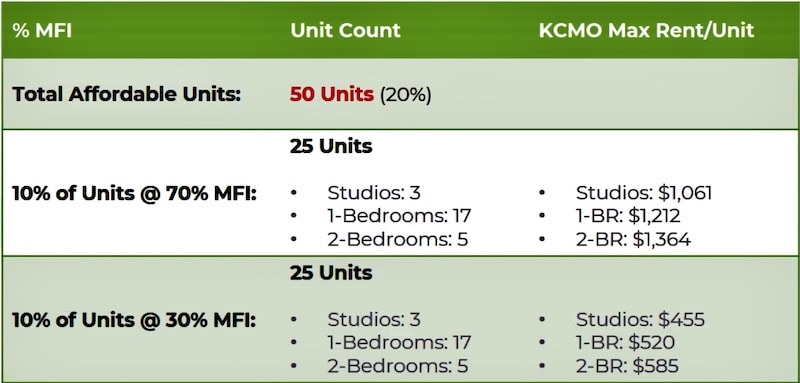After Some Sleuthing, Port KC Committee Endorses Riverfront Apartment Plan

Published May 10th, 2022 at 11:30 AM
By Kevin Collison
A proposed 250-unit apartment riverfront project was endorsed for a 25-year property tax abatement Monday by a Port KC committee, but only after a little sleuthing in St. Louis by top officials at the agency.
Lux Living wants to build the $56 million project that would be the first to meet the city’s affordable housing policy established more than a year ago, but the St. Louis firm has encountered negative press in its hometown and locally.
The St. Louis Post-Dispatch ran a critical article last month and Monday, Kansas City public radio station KCUR reported Victor Alston, the executive at Lux Living, failed to disclose to Port KC he’d been sanctioned by the Securities and Exchange Commission in 2017.
So, Jon Stephens, Port KC executive director, and Krishan Purvis, senior development manager, hit the road last week and visited four Lux Living apartment developments including one under construction and one that had recently been sold.
Purvis told the Port KC Development Committee the pair informed Lux Living execs they were coming, but didn’t say which projects they would be touring and when. They then interviewed residents, maintenance staff and St. Louis development officials.

The 152-unit Hudson apartment project in St. Louis was one of the Lux Living developments visited by Port KC officials. (Image from Lux Living website)
They came back satisfied with the responses they received, saying most people they interviewed praised the quality and cleanliness of the developments, their amenities and how quickly maintenance issues were resolved.
“We’re not saying there’s no bad things that have happened in the past,” Purvis said, “but the time we were there all day from 8- to 5 checking out these properties there was no evidence to substantiate what was written in those articles.
“We have taken the serious allegations in those articles into consideration, we did do significant due diligence in investigating via the site tour and we’ve built in protections in our legal documents.”
As for the SEC sanctions, Brian Rabineau, Port KC deputy general counsel, said when Alston approached the agency about developing his project, that information was not required on the development application.
“Strictly speaking, the SEC was not required to be disclosed by our application in effect at the time,” he said, “and the reason for that they were never formally charged of the violation.
“Mr. Alston voluntarily surrendered his license and paid a monetary penalty in lieu of charges.”
Rabineau said Port KC has tightened its application disclosure requirements since the Lux Living application was filed last year.
“If this project was coming forward today, that is something that would have been required to be disclosed,” he said.

This Port KC chart breaks down the affordable units proposed for the Lux Living development and the rents.
As for the project itself, at seven stories, it would be the tallest built on the riverfront to date. It also would reserve 50 of its units as affordable housing to meet the standard established by the City Council early last year.
Ten percent of the units would be affordable to households making 70 percent of area median income (AMI) and 10 percent would be affordable to those making 30 percent of AMI.
Port KC officials said they negotiated with Lux Living to provide a mix of units to be affordable, not just studios. For those making 30 percent AMI, monthly rent for a studio would be $455; one-bedroom, $520, and two bed-room, $585.
In order to make the project financially viable, the developer is seeking a 25-year property tax reduction from Port KC, 90 percent for 10 years, 75 percent for 10 years, and 25 percent for five years.
“For the year and half the affordable housing ordinance has been in place in Kansas City, Missouri, there have been no new projects that have been permitted on the multi-family side because of the affordable ordinance, Purvis said.
“This is the only one being brought forth to you today for approval because it can meet it, and yes, it does take a 25-year tax exemption to do that.”
At the time it was approved, developers warned the new ordinance would dramatically slow down activity in the city because of the additional financial burden it would place on projects.
The 25-year property tax abatement request was criticized by representatives of taxing jurisdictions including the Kansas City School District and the Community Mental Health Fund. They argued it reduced their future tax revenues too deeply and too long.
The property where Lux Living wants to build its project however, currently pays no property taxes.
Under the terms of the proposed incentive package, the taxing jurisdictions would receive $5.5 million in new revenues over its 25-year life. The developer would save about $12.6 million in property taxes during that period.
“The biggest thing to us,” Purvis said, “is this has been historically vacant ground for the last 100 years, it hasn’t had any development at all and hasn’t produced any money for the taxing jurisdictions so any dollar is net positive to the taxing jurisdictions.”
The development committee voted 5-1 to recommend Port KC authorize $56 million in revenue bonds to finance the project. City Councilman Kevin O’Neill, a Port KC commissioner, opposed the measure.
The full board is scheduled to consider the proposal at its meeting May 16.
In other matters, the development committee decided to send a proposal to build at $29 million boutique hotel on the riverfront to the full Port KC board without recommendation.


